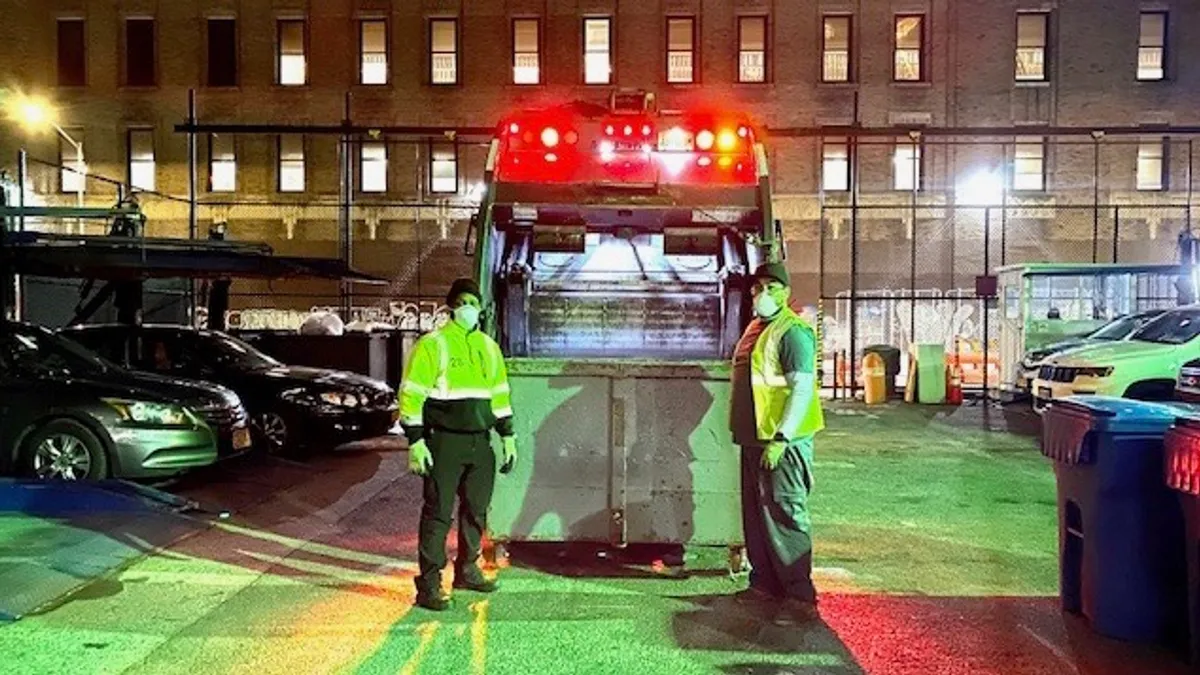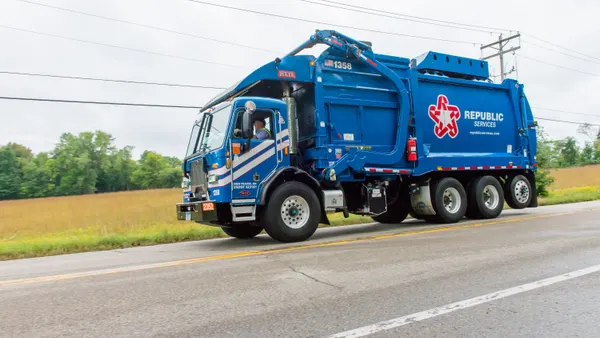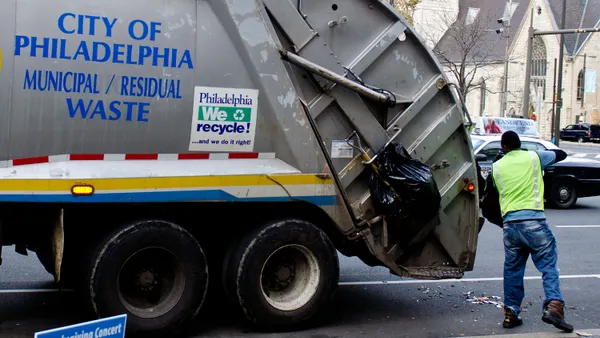What looked like it would be another boom year for waste and recycling companies has dramatically shifted within a matter of weeks to become the year of COVID-19. Business continues, as the industry's services have been deemed essential during the pandemic, but no one can predict what it will look like on the other side.
Protecting employees from the coronavirus is said to remain the industry's top priority, with significant attention focused in recent weeks on new procedures for frontline workers and shifting thousands of administrative personnel to remote arrangements. But with commerce largely shut down in many parts of the United States, some companies are faced with the existential issue of maintaining those jobs in the first place.
Regardless of their size or financial reserves, all of the industry's service providers are still navigating a host of largely unforeseen questions about how to do business. Waste Dive spoke with more than a dozen executives and analysts over the past week to learn more about how they are pivoting to life in the new coronavirus economy.
Commercial crunch
Across the country, retail stores, bars, restaurants, gyms, schools, hotels, entertainment venues, sports arenas, airports, office towers, casinos and construction projects have largely gone dark. Their containers have emptied out in turn, leading to a dramatic reduction in bedrock commercial and industrial volumes.
"Commercial for us is at a complete halt," said Gregory Lettieri, CEO of New York-based Recycle Track Systems (RTS), last Monday. While Lettieri noted demand continues from certain customers such as grocery stores, and interest in on-demand services has increased, he described activity at many sites across the company's multi-city footprint as essentially frozen.
Other companies working in New York, a market where the private sector has limited diversification in residential business unless it's outside the five boroughs, have made major cuts to the number of routes they are running and are processing less material at their facilities.
Interstate Waste Services (IWS) has laid off staff at its MRF in the Bronx, partially due to operational factors around social distancing but also because commercial recycling volumes are down significantly. Ron Bergamini, executive vice president of government relations, said clean cardboard is still a priority, but the limited volume of material has meant IWS needs to temporarily dedicate its attention elsewhere.
"Recycling is an important part of our business and mission, but at this time let’s focus on priorities of the moment — social distancing and allocating resources," he said. "We are making sure we can serve hospitals and new health facilities. If recycling suffers for a few weeks, so be it."
In addition to healthcare facilities, demand is also steady across other essential sites in the Northeast including grocery stores, bodegas, convenience stores and food manufacturing facilities.
In one sign of this sudden shift, Vanguard Renewables — the largest anaerobic digester operator in the Northeast — has seen inbound organics volumes increase during recent weeks.
"The vast majority of our work is with direct manufacturers and grocery stores," said CEO John Hanselman on March 20. While the company's usual business with colleges and universities is down significantly, "it's been more than offset to date by folks who are trying to keep food on the shelves." Hanselman noted this was not the case for route-based organics recyclers, which often service restaurants and smaller clients that have now closed.
Hanselman recently confirmed this situation continues, with no near-term visibility about when supply chain operations might normalize or how volumes will change in the weeks ahead.
The market in other hard-hit areas is said to be in a similar state of disorientation. In Massachusetts, regional hauler E.L. Harvey & Sons furloughed 83 of its 350 employees a week ago because it anticipated a drop-off in business due to state-mandated closures. Last Friday, the company decided to call up more than 25 of them and change course.
"We cut a little deep and we decided we needed some people back," said President Ben Harvey yesterday.
While construction volume is down slightly, the real issue is Harvey's smaller customers. "Where we’ve seen probably the biggest impact is in our front-load commercial routing, because of all the restaurants that have been closed for the longest period of time and then a lot of the small businesses that are impacted by being non-essential."
In Chicago, now a major area of coronavirus concern itself, commercial and roll-off container business is down enough to the point that at least one large regional player was begrudgingly considering its own layoffs last week.
"I don’t want to let what I view as a temporary situation — although it’s very dramatic — change the trajectory of our company or our culture," said Alan Handley, CEO of Illinois-based Lakeshore Recycling Systems, last Wednesday.
Yesterday, Handley confirmed his company had done furloughs for some workers on the temporary container and construction line of business, but no other parts of the operation.
In other parts of the country, including southern states, the effects have not yet been felt as heavily for some companies.
"We’re certainly in close contact with our commercial customers and if they have business requests and business needs we want to work with them to rightsize their service," said Matt Spencer, COO of Texas-based WCA Waste Corporation, last Thursday. "We’re not pulling cans, we’re not reducing routes yet." Spencer confirmed yesterday that remains the case.
Some of the industry's largest companies, with national footprints, have recognized the decline but so far appear more resilient. Waste Management recently pledged to pay all employees for the equivalent of a 40-hour week (after any relevant government assistance or benefit funding has kicked in) if the economy sees an extended downturn.
"We’re facing this health crisis and for us keeping people employed and paid and making sure that they have health insurance is paramount," said COO John Morris last Thursday, recognizing the difficulty of replacing workers. "We want to be in a position to make sure that we’ve got the right folks on the team to be able to respond and rebound when our customers need us."
Waste Management is likely not the only one of the industry’s largest companies that will hesitate to implement major layoffs.
"If we go into a severe downturn we don’t think companies are going to let go of labor the way that they did in 2009," said Hamzah Mazari, a managing director at Jefferies, in reference to challenges in staffing up amid a labor shortage. "Unless it’s a very strong, deep and long downturn. Then maybe they do."
Service decisions
While the effects on commercial business may not end up being universal in every area, financial analysts are anticipating a notable decline in small container revenue across the industry's publicly-traded companies. Michael E. Hoffman, managing director at Stifel, recently projected that commercial sales in the most hard-hit areas could be down by as much as 50% for April and May. This and other factors, according to Hoffman, could contribute to a double digit percentage reduction in projected annual revenues among all of the industry's publicly-traded haulers.
"I definitely have evidence across a wide selection of private companies, there’s no question there are service holds happening in commercial," said Hoffman last Friday, noting the clear preference was to work with customers on suspensions to keep relationships open. "They're avoiding cancel at all costs."
Multiple companies Waste Dive spoke with indicated this is their preference as well, with some saying they were even dealing with situations on a case-by-case basis.
"We’ll work with people, but we’re not going to pull containers. We’ll let them continue to rent the containers with the hope they’re going to come back in four to six weeks," said Lakeshore's Handley, mentioning the goal was to try and get smaller customers caught up on any existing balances before discussing flexibility for upcoming service. "We look at it as really a temporary situation, we’re not acting like it’s the end of the world."
"For us, I think we’re just focused on what services do they need and how much volume are we picking up and making sure we’re charging accordingly," said Lettieri of RTS, mentioning this could include a range of customers from restaurants to office buildings. "If a building is closed and going to less service then they should pay less."
While approaches varied for some, the North American industry's largest player said its scale necessitated a more uniform approach.
Outside of more specific conversations for commercial franchise business in West Coast markets, which is being handled in part by Waste Management's public sector team, Morris said the company is presenting similar options to its millions of commercial and industrial customers. Extending payment terms, stopping service suspension for nonpayment, suspending late fees, limiting overage charges and waiving reinstatement fees are all on the table.
"We are working to make sure that we are making long-term decisions that our customers are going to look at as a relief valve temporarily," said Morris, adding the goal was to keep relationships positive for when businesses start to reopen again. "Now is the time for us to really demonstrate that we are partners for our customers and not just a vendor."
About half of traditional customer churn is driven by switching to competitors and the rest is due to bankruptcies, Mazari said. That dynamic makes the coming months even more crucial for when some semblance of economic normalcy returns.
"The longer the shutdown lasts, the greater the risk is that there will be bankruptcies for small businesses," said Mazari last Thursday. "Net new business in the waste sector comes in at a discount and then you gradually price increase that business. And so for the waste companies customer retention becomes very important."
Early discussions indicate some amount of give and take is considered best practice in responding to the disruptions created by this pandemic.
"What we think people should do is be in contact with each other and be reasonable under this circumstance because we’re in uncharted waters here," said Solid Waste Association of North America CEO David Biderman. "Haulers need to recognize they’re going to need their customers after the pandemic ends and customers need to realize they’re going to need a hauler after the pandemic ends."
Beyond the hauler to customer relationship, this unique moment is also prompting new discussions at another step in the materials handling process.
Derek Veenhof, Covanta's executive vice president of asset management, said the company is well-positioned because about 80% of its volume is under contract but some commercial arrangements have become more flexible. While the shift from commercial to residential volume has been masked in some contracts that include both streams, the decline is still quite apparent at certain facilities. Covanta has been working to optimize throughput by utilizing its transfer station network, while also keeping an open dialogue with haulers.
"It’s something that no one has really seen before and we’re trying to be fluid and work with our customer base," he said last Friday, pointing out the pandemic could possibly be considered "force majeure territory" and it doesn't benefit either side to pretend otherwise. "If there's no waste at the curb for that hauler to collect you can’t say, 'oh by the way you owe us 100,000 tons.'"
Into the unknown
Many also recognized even with all of these efforts to keep relations friendly with customers, some amount of disruption is already baked in given the fact that some businesses won't be coming back. For example, in the event of layoffs, customers may forget to call and containers could be temporarily stranded.
"We are acquiescing to people’s requests. They’re asking us to suspend service, we’re suspending service at this point, no questions asked," said Bergamini, of IWS, last Tuesday. "I think the real work is going to be once we start to come out of this."
"Unfortunately, the trash man seems to be at the bottom of the totem pole when it comes time to send the bills out," said Harvey, adding he hoped to see customers return and prosper but is anticipating that won't be the case for everyone. "We’re very concerned about increased bad debt as we move forward."
"I think we would be naive if we assumed that 100% of the commercial stuff is going to turn back on again. It’s not," said Hoffman. "You can’t throw enough money at this fast enough."
The $2.2 trillion CARES Act package signed by President Trump last Friday was largely viewed as a positive factor in terms of helping both customers and employees stay liquid during these times, per multiple people Waste Dive spoke with, though its potential effects on industry companies themselves may vary.
While both Mazari and Hoffman agreed the industry's largest companies have no need of stimulus funding even if they could qualify (a point with which Waste Management's Morris also concurred), there was recognition it could be a boon to smaller competitors that are less liquid.
"We know the Fortune 500 companies," said Rubicon Global CEO Nate Morris last Monday. "They’re going to be just fine and they’re going to make it through this crisis with no problem." Rubicon, whose core business relies in part on smaller haulers, has been calling for them to get more recognition over the past week and also sharing information with its partners about applying for possible relief funds.
"[These companies] are critical to keeping prices competitive, to keeping the market competitive and to keeping the industry honest and they have provided a great balance of power," said Morris.
Lettieri of RTS, whose company is expanding into residential contracts but also relies in part on a similar model of independent hauling partners, said Rubicon's message was "spot on" given how thin margins can be some for private companies.
"It is very possible that large and small haulers do not make it through this," he said. "The better run operators will survive and will thrive coming out of this. Poorly managed companies will not survive."
Smaller companies that are over-levered, or too dependent on a particular customer base or line of business, may be more vulnerable unless relief funding provides "a lifeline that allows them to get through to the other side," Hoffman said. As for the industry's largest companies, Hoffman expects this moment may serve as a chance for the sector to prove its versatility.
"If you’re Amazon and Walmart and Clorox your numbers are going to be up. But everybody else in the economy, their numbers are going to be down," he said, describing the months ahead as a pivotal moment for companies of all types. "I think garbage is going to prove they have more flexibility than may be fully appreciated at the moment."











